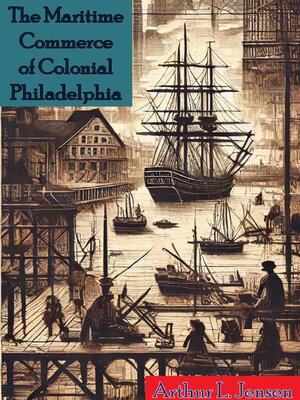
Sign up to save your library
With an OverDrive account, you can save your favorite libraries for at-a-glance information about availability. Find out more about OverDrive accounts.
Find this title in Libby, the library reading app by OverDrive.



Search for a digital library with this title
Title found at these libraries:
| Library Name | Distance |
|---|---|
| Loading... |
Arthur L. Jensen's The Maritime Commerce of Colonial Philadelphia offers a detailed exploration of the bustling maritime trade that transformed Philadelphia into one of the most important ports in colonial America. Through meticulous research and vivid storytelling, Jensen examines the economic, social, and political forces that shaped the city's rise as a key center of commerce and trade in the 18th century.
The book delves into the intricate web of trade routes connecting Philadelphia to the Caribbean, Europe, and other American colonies, showcasing the city's role as a hub for goods such as tobacco, grain, and textiles. Jensen also highlights the individuals and industries that drove this trade, from merchants and shipbuilders to dockworkers and sailors, illustrating how maritime commerce became the lifeblood of the city's economy.
In addition to its economic impact, Jensen explores how maritime activity influenced Philadelphia's cultural and political development, fostering a cosmopolitan identity and playing a pivotal role in the city's emergence as a revolutionary stronghold. The book provides a nuanced look at the challenges faced by colonial merchants, including piracy, economic regulations, and competition, offering readers a comprehensive understanding of the era's maritime dynamics.
The Maritime Commerce of Colonial Philadelphia is an essential resource for anyone interested in colonial American history, maritime studies, or the economic foundations of one of America's most historically significant cities.
The book delves into the intricate web of trade routes connecting Philadelphia to the Caribbean, Europe, and other American colonies, showcasing the city's role as a hub for goods such as tobacco, grain, and textiles. Jensen also highlights the individuals and industries that drove this trade, from merchants and shipbuilders to dockworkers and sailors, illustrating how maritime commerce became the lifeblood of the city's economy.
In addition to its economic impact, Jensen explores how maritime activity influenced Philadelphia's cultural and political development, fostering a cosmopolitan identity and playing a pivotal role in the city's emergence as a revolutionary stronghold. The book provides a nuanced look at the challenges faced by colonial merchants, including piracy, economic regulations, and competition, offering readers a comprehensive understanding of the era's maritime dynamics.
The Maritime Commerce of Colonial Philadelphia is an essential resource for anyone interested in colonial American history, maritime studies, or the economic foundations of one of America's most historically significant cities.







